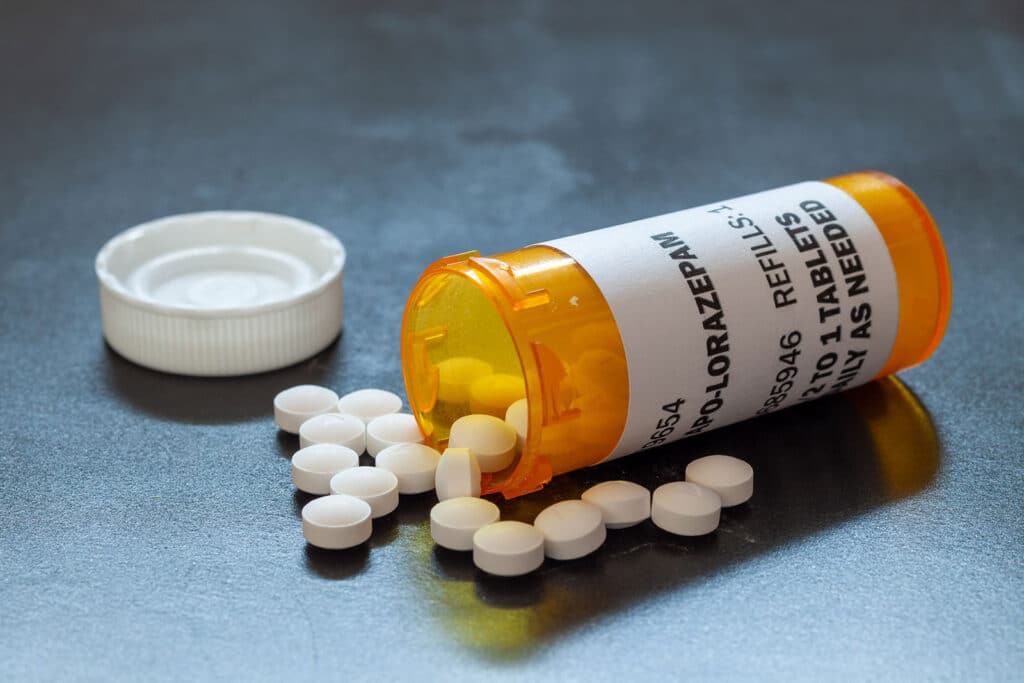Medications play a critical role in improving your health and helping you function better. However, for any prescription drug you take, you need to understand the possible risks, including addiction. Ativan is one example of a potent drug with addictive properties, and anyone taking it should know about the signs of Ativan addiction and the importance of seeking professional treatment.

Table of Contents
What Is Ativan?
Ativan is the most widely known brand name for lorazepam, a medication that belongs to the drug category of benzodiazepines (benzo).
Benzodiazepines influence gamma-aminobutyric acid, a neurotransmitter that reduces activity in the nervous system. Because they can exert a calming effect on people, benzodiazepines are mainly prescribed for anxiety and insomnia, though medical providers sometimes find other uses for them.
The primary purpose of Ativan is to counteract symptoms of anxiety, including panic attacks, agitation, sleeplessness, and persistent fears that aren’t justified. Doctors also sometimes use it for insomnia, seizures, and the management of alcohol withdrawal syndrome.
What Are The Risks Of Ativan?
Although Ativan is a potentially useful medication, it also poses risks to physical and psychological health.
Even if you’re strictly following a doctor’s orders, the drug may inflict a variety of side effects, including nausea, drowsiness, blurred vision, headaches, and heartburn. In some cases, the drug can also cause memory problems, confusion, slowed breathing, difficulty walking, or serious changes to your mental state, such as depression.
Ativan Addiction
The development of psychological and physical dependence is the greatest risk of taking Ativan. Like other benzodiazepines, Ativan has a strong potential to become addictive, and the chance of addiction increases the longer it’s used.
This is why doctors typically don’t turn to Ativan as a first-choice drug. They may prescribe it only after another medication has failed to work well for a patient. Even then, they try to limit Ativan to short-term use, preferably less than a month.
After only one week, some people begin experiencing withdrawal symptoms if they stop taking Ativan. These symptoms include irritability, sweating, and headaches. When Ativan is taken for a longer period of time, withdrawal tends to become more severe. It may manifest in seizures, hallucinations, heart palpitations, hand tremors, changes in blood pressure, and panic attacks.
One withdrawal effect to watch out for is rebound anxiety. When you stop using Ativan, your anxiety symptoms may return powerfully, making you feel agitated and depriving you of sleep. The experience of rebound anxiety can become so intense and unpleasant that you may regret getting off the drug.
If you’re taking Ativan, it’s crucial to avoid an abrupt stop to your usage. Doctors will taper your dosage to reduce the risk of serious withdrawal. With medical guidance, you can gradually get weaned off the drug.

Signs Of Ativan Addiction And Abuse
Even when used legitimately and with medical supervision, addiction is a possibility for Ativan use, especially when patients take it for weeks. The risk of addiction shoots up even more when people abuse the drug, using it in ways that doctors wouldn’t permit.
The signs of Ativan abuse and addiction include the following:
- You’re disregarding a doctor’s orders, maybe by taking a higher dosage than the one prescribed or by dangerously consuming the drug, including crushing and snorting it.
- You may not even have a legitimate prescription.
- You’re mixing Ativan with other drugs in a potentially life-threatening way. One example is a combination of alcohol and Ativan, which can lead to respiratory problems, a coma, or death.
- You’re experiencing cravings, and you’re doubting your ability to function without Ativan.
- Your tolerance to the drug is building so that you need high doses to produce the desired effect.
- You’re struggling to cut down on your drug use, and you’re concerned about severe withdrawal.
- The drug increasingly dominates your thoughts. You keep wondering when you’ll next take it and how to obtain the next dose.
- You’ve started lying or stealing to acquire the drug. Examples include faking symptoms to try to get a prescription or stealing money from family to purchase Ativan illegally.
- Your Ativan use is interfering with your life. You’re neglecting obligations, your relationships are suffering, and your performance at work or school has deteriorated. You may also be experiencing financial or legal problems.
- You’re engaging in reckless behavior, such as driving while feeling drowsy from Ativan use.
- You’re neglecting your personal grooming and other self-care habits. Maybe you’ve stopped eating nutritiously or getting a healthy amount of sleep.
Do any of the items on this list look familiar? If so, you need to consider the possibility that you have an addiction to Ativan. It’s also possible that you haven’t yet reached the point where you’re addicted to the drug, but you’re abusing it, exposing yourself to serious social and health-related consequences. Either way, you need to reach out to medical professionals and addiction counselors who can help you stop using this potent benzodiazepine.
Ativan Detox
When overcoming Ativan addiction, a medical detox treatment can be highly beneficial for you or your loved ones. When they undergo medically supervised detox, healthcare specialists will keep an eye on you, evaluate your symptoms, and take action if your health is in danger. Doctors may occasionally prescribe other drugs to assist with drug detox process and withdrawal (benzodiazepine withdrawal or lorazepam withdrawal) in a safe manner.

Therefore, therapy is crucial for treating any addiction type. With Ativan physical dependence, although patients could overcome it, however, it’s just the beginning of their recovery. They also need to work on the psychological issues that led to their addiction and learn coping mechanisms so they can deal with difficulties in life without feeling the urge and discontinuation to use drugs again.
Ativan withdrawal could led to acute withdrawal syndrome or severe withdrawal symptoms, which have a number of unpleasant side effects, so your best course of action is to detox under drug administration by medical experts.
For those battling various addictions, Garden State Treatment Center offers inpatient therapies, mental health disorder treatment and counseling, aftercare, and medication-assisted treatment. If you need assistance with your Ativan addiction, please get in touch with us immediately.
Why You Shouldn’t Delay Seeking Help
The longer your Ativan misuse persists, the higher your chances are of suffering serious negative consequences.
One potentially deadly outcome is an overdose. The signs include shallow breathing, slurred speech, intense sleepiness, a slow heart rate, an alarming drop in blood pressure, and loss of consciousness. The risk of overdose is exacerbated if Ativan is taken with other drugs, such as alcohol or opioids.
Along with addiction, the long-term use of Ativan may cause cognitive impairments, such as memory-related difficulties. In some cases, the cognitive damage isn’t fully reversible. Older people taking benzodiazepines for a prolonged period of time may be especially vulnerable to cognitive decline.
It’s also important to keep in mind that addiction usually involves neglect, which ranges from a poor diet to an avoidance of supportive relationships. As you sustain damage to your physical and psychological health, your overall quality of life deteriorates. Also, the social repercussions of addiction can affect you for years.
Regardless of how far along you are in your addiction, don’t hesitate to reach out for help. Even if you can’t picture your life improving, know that you can, in fact, make positive changes. You have the power to change in ways that you may not be able to imagine at the moment.
Why Do You Need Professional Help For An Ativan Addiction?
The withdrawal process is one of the main reasons you need assistance in fighting an Ativan addiction. Because the withdrawal symptoms can be painful, severe, and sometimes life-threatening, you need medical supervision as you undergo detoxification.
Doctors will monitor your health, including the presence of seizures, rapid heartbeat, and increased blood pressure. They may also give you medications that potentially provide some comfort during withdrawal. For example, some people benefit from Paxil, an antidepressant that may help alleviate certain withdrawal symptoms.

Your substance abuse treatment will be individualized because not everybody experiences withdrawal the same way or responds positively to specific interventions. For many people, Ativan withdrawal symptoms are strongest for two weeks and then linger in a milder form for a couple of weeks more. However, some people experience withdrawal symptoms for months, which makes it even harder for them to resist the temptation to relapse.
Multiple factors contribute to the individual variability in Ativan withdrawal, including:
- The dosage and duration of use.
- Overall health, including any mental health issues.
- Other drugs are taken at the same time.
People need psychological support during detoxification and throughout the addiction recovery process. You can receive substantial benefits from both inpatient and outpatient rehabilitation programs. As part of rehab, you’ll participate in group therapy and receive one-on-one therapeutic interventions. These may include Cognitive Behavioral Therapy and other forms of evidence-based care.
After rehab, you can facilitate your recovery in multiple ways, including continued therapy or counseling, support groups, and residence in a drug-free environment, such as a sober living home.
The ongoing support will help you deal with cravings, temptations, and any protracted withdrawal symptoms. You’ll be in a better position to maintain sobriety and change unhealthy habits of thought and behavioral health concerns. You’ll work on strategies that improve your health and strengthen your ability to build a meaningful life that’s free from drug misuse.
Contact Garden State Treatment Center
If you have additional questions about the Ativan addiction treatment facility and healthcare provider for a possible detox program for substance use disorder and other treatment options, don’t hesitate to reach out to us. We deliver high-quality care that’s tailored to your particular needs, and our treatment programs offer safe and compassionate support.
FAQ
How does ativan make you feel the next day?
How long does ativan last?
How long does it take to get addicted to ativan?
Can you get addicted to ativan in 2 weeks?
How long does Ativan take to work for panic attacks?



